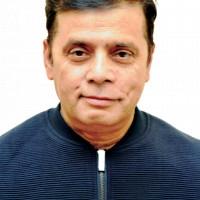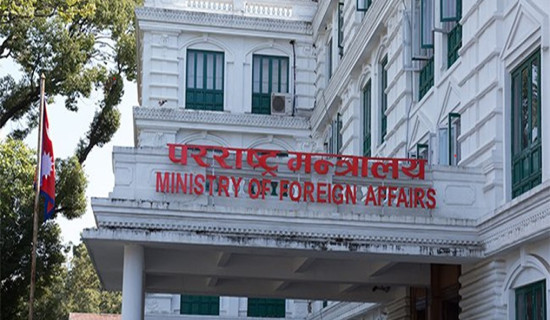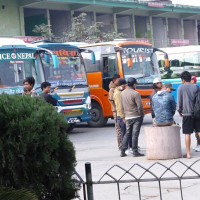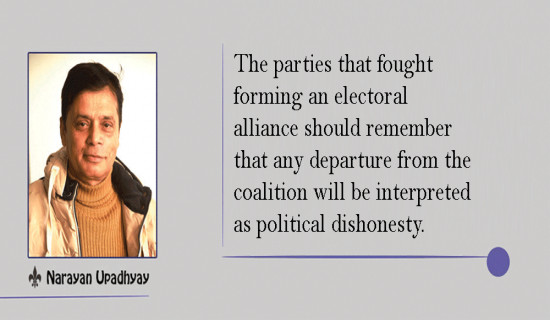- Wednesday, 4 March 2026
Constitution Reforms For Efficient Governance
A constitution is a framework that leads a country through the various stages of its political, social, and economic development. Constitutional experts say regular evaluations and revisions are not indicative of failure but rather of a functioning democracy that is sensitive to its country’s needs. To better serve the nation and its people, our current constitution has already identified areas that need revisions.
Nearly ten years have elapsed since our country embraced its constitution via the representatives elected by citizens. The constitution, implemented on Ashoj 3, 2072 BS (September 20, 2015), had replaced the interim charter of 2007 and transformed our nation into a federal democratic republic, laying greater emphasis on secularism, inclusivity, and a pro-socialist economy as significant features.
Despite having a constitution prepared by a Constituent Assembly comprised of people’s representatives, our country continues to face political instability, governance issues, and a federal system that has yet to function as desired by all stakeholders of the charter. Owing to this, stakeholders have felt a greater urge for constitutional assessments and modifications for addressing these concerns and aligning the charter with the nation's contemporary needs and goals.
Collaborative approach
The nation has seen rapid changes in governments over the last 10 years, with our parliament producing hung parliaments following the 2017 and 2022 general elections. Following such instability, inefficient governance, and increased abuse of authority in federal governance, the provincial administrations and local units, experts, and stakeholders are stepping up to correct some ‘inherent flaws’ in our charter.
The obligation for leading constitutional reforms undoubtedly rests on the shoulders of Nepal's major political parties, such as the Nepali Congress and the CPN (UML). However, for these revisions to reflect the desires of the people, a collaborative approach is required. Parties like the Maoist Centre, which sees itself as an architect in ushering federal republicanism in Nepal, as well as fringe parties, civil society organisations, and marginalised communities, must be brought on the same pedestal while going for charter amendments. The two major parties have, however, stated that amending the statute would serve to strengthen our democratic federal governing structure and deepen national inclusion.
Parties, meanwhile, are in greater need of correcting the quandary over political instability that has slowed our economic growth and development, disrupted government, and weakened public trust in democratic institutions. To solve this, constitutional revisions must target clauses that have led to political turmoil. For example, improving the laws governing the proportional representation (PR) system, votes of confidence, and government formation could lead to a more stable political environment, according to experts.
Other areas that require constitutional reforms are the electoral and executive systems. Current measures, such as the proportional representation system, which sees the nomination of 110 lawmakers in a 2075-member House of Representatives, and government formation rules, have been criticised for contributing to political instability.
Potential reforms for a more stable executive include enforcing a provision whereby the party winning a majority would form its government and the party finishing at the second place should act as a responsible main opposition. Some also argue exploring a direct executive system in which the head of government is elected by the people could improve stability and accountability.
Others say that it is time that our stakeholders should think about moving the provision of PR systems from the House of Representatives to the Upper House, lessening the number of lawmakers in all seven provincial parliaments, and decreasing the total number of local units from 753 at present to around 300-350. It would help save the federal budget as well as bring efficacy in service delivery.
Legislative loopholes
Nepal's administrative structure, consisting of federal, regional, and municipal governments, requires decentralisation with the sole aim of bringing governance efficiency closer to the people. However, the implementation aspect of devolution of power has been hampered by a lack of clarity regarding the division of authorities, resource allocation issues, and legislative backlogs.
Furthermore, rising incidents of abuse of authority at the three tiers of government and bureaucracy are a serious issue that must be addressed through good governance, for which charter amendments become indispensable. We need constitutional amendments to clarify each level of government's functions and obligations.
In addition, our country's political system includes inclusion and proportional representation as essential concepts, with the goal of ensuring that all sections of society are represented in government. Nonetheless, there are worries about the misuse of these concepts, with some arguing that they have resulted in nepotism and misuse and manipulation by leaders. Party leadership is accused of exploiting the PR system by nominating their near ones and die-hard supporters as lawmakers to increase their clout.
Several legislative loopholes make it difficult for parties to fully alter or implement several constitutional provisions, diminishing the constitution's effectiveness. For example, the NC and the UML will have a tough time amending provisions of the PR system because the Maoist Centre and other smaller parties are dead against it as they think this system would allow them a good or desired level of representation in parliament.
Meanwhile, some vital bills, including those involving civil service, police, and federal education, are awaiting their endorsements at the parliament. The delay is due to inaction or reluctance on the part of several parties representing at parliament to endorse them because of their vested interests.
Some vital articles and clauses in our statute that openly state that the members of the public would get free healthcare and education are yet to become effective.
The education, healthcare, and transport systems of the nation have all gone to private hands, causing a lot of suffering to the people. This has created suspicion among people regarding the effectiveness of our charter.
Lessons from Abroad
Our leaders would do well if they learnt some useful lessons from the experiences of federal democratic nations such as the United States, the United Kingdom, and India, as well as a few others that have successfully negotiated constitutional amendments to address emerging difficulties. The United States Constitution, one of the world's oldest, has undergone 27 amendments since its adoption. These modifications in the US charter have addressed topics ranging from civil rights to government structures, emphasising the significance of flexibility and public participation in constitutional development.
The United States example demonstrates that a constitution must be adaptive to protect citizens' rights and respond to changing national requirements. Unlike many other countries, the United Kingdom does not have a written constitution, but its constitutional system is renowned for its adaptability, evolving in response to parliamentary amendments and judicial interpretations. This flexibility has enabled the UK to respond quickly to societal developments, illustrating the value of a dynamic constitutional approach.
Our southern neighbour's constitution, the world's longest, has undergone multiple amendments to meet the country's diverse and changing demands. These revisions have helped to balance the powers of the central and state governments, ensuring that the federal system remains functioning and relevant. India's experience demonstrates the significance of a constitution capable of accommodating the intricacies of a federal system, as well as the need for regular review to reflect its population's changing expectations.
These case studies demonstrate and offer useful insights for Nepal to improve its own constitutional structure to better serve its people.
Meanwhile, for constitutional modifications to reflect the requirements of the nation, comprehensive and constructive dialogues among political parties, professionals, civic society, and the public are required. Such dialogues should be open and inclusive, allowing for a variety of perspectives aimed at an informed amending process. This method not only strengthens the legality of the modifications but also contributes to public faith in the constitution.
(Upadhyay is a former managing editor of this daily.)








-square-thumb.jpg)








